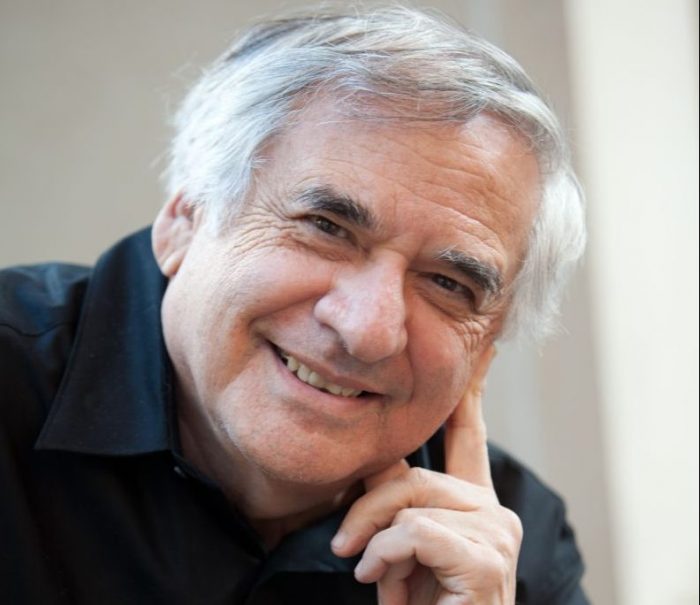
For Simon Sargon’s 80th birthday in 2018, his synagogue, Temple Sinai, held a concert.
Fifteen cantors, three instrumentalists and 175 volunteer singers were there to perform Sargon’s compositions, written during his decades-long career.
“It’s just a broad cross-section of what was going on for 40 years as I was working in a temple and writing music,” Sargon told Washington Jewish Week at the time.
His music compositions ranged from symphonic, vocal and choral works to chamber ensemble pieces and opera.
Sargon, a Chevy Chase resident, pianist, music educator and classical composer, whose works embraced both the Jewish and secular realms, died on Dec.25. He was 84.
“Musicians enjoyed working with him because he was always striving for the highest level of artistic performance,” said his daughter, Olivia Sargon-Glasgow, of Chevy Chase. “My father has clearly added to the repertoire, to the body of contemporary classical music.”
His Jewish-themed works include his opera “Saul, King of Israel,” for which he took a decade to compose the libretto and the music.
“It was a very proud accomplishment, the culmination of many years involved in that work,” said Sargon-Glasgow, of Temple Sinai.
He also completed “Tapestries,” a four-movement orchestral piece based on the original opera.
One of his most haunting pieces is a chamber music composition inspired by — and featuring — the poetry of Italian Jewish chemist and Holocaust survivor Primo Levi.
Sargon’s song cycle, “Shema,” is a setting of five poems by Levi for soprano, flute, clarinet, cello and piano. It is regularly featured in Holocaust and Kristallnacht commemoration programs.
Sargon told Washington Jewish Week in 2018 that he always admired Levi. He described Levi’s poetry as “a very intense piece about his life in Auschwitz and doing experiments in the camps. It’s kind of lashing out against the people who never did anything to stop the war and I identified with that.”
He also composed klezmer and Yiddish works.
Sargon’s influences were cross-cultural. He was born in Bombay (now Mumbai) in British-ruled India, in 1938, to a family of Sephardi, Indian-Jewish, and Eastern European Ashkenazi heritage. When he was an infant, they moved to Boston by way of Washington, D.C. He was raised in what he called “an intensely Zionistic household.”
A graduate of Brandeis University and the Juilliard School, Sargon served as composer-in-residence at synagogues around the country and was made an honorary member of the American Conference of Cantors in 2003.
Among his endeavors, Sargon taught at Sarah Lawrence College and the Juilliard School in New York, chaired the Opera Department of the Rubin Academy of Music in Jerusalem in the early 1970s and served on the music faculty at Southern Methodist University in Dallas from 1984 to 2013. While there, he directed music at Temple Emanu-El, bringing the choir to prominence through tours and recordings.
“He had a sharp wit. He enjoyed jokes and puns and a good turn of phrase,” said Sargon-Glasgow. “He always made sure he had one or two jokes to prepare the singers for temple choir rehearsal.”
In a 2006 interview with broadcaster Bruce Duffie, he said that to be able to compose while carrying a full teaching load, “it’s a constant, constant problem of just carving out time from the day’s schedule, and trying to make use of even little bits of free time that are available… . When I’m walking around or doing errands I’ll be trying to think through a compositional problem… . I have a piece of music paper in my wallet, so that I can jot down anything.”
Sargon and his wife of 63 years, Bonnie Glasgow, moved to the Washington area from Dallas in 2016 to be near family. Glasgow, a singer, performed Sargon’s works.
They joined Temple Sinai in D.C. where Senior Cantor Laura Croen had been performing Sargon’s works for years.
Before the 2018 birthday concert, Croen told WJW that it was “a wonderful honor to have him as a member and to share with the community all of the richness of his compositions and his talents.”
Sargon’s body of work is accessible through many CD recordings, appearing as composer and pianist.
In addition to Glasgow and Sargon-Glasgow, Sargon is survived by his son-in-law, Michael Blayney; grandchildren, Juliana and Adam Blayney; a brother, Ivor (Lucy) Sargon, of Atlanta; and sister, Wendy (David) Bar-Yakov, of Jerusalem.
Donations may be made to the Indiana University Jacobs School of Music Simon Sargon Memorial Music Scholarship, payable to “IU Foundation”, c/o IU Foundation, P.O. Box 6460, Indianapolis, IN 46206-6460; and the U.S. Holocaust Memorial Museum (ushmm.org).
Asked by Duffie, “Why have music at all?” Sargon said, “Music is one of the greatest, richest and most satisfying gifts that we as humans have on Earth. Without music, my life would be devoid of meaning. It would be bare and empty. I can’t imagine it.”




